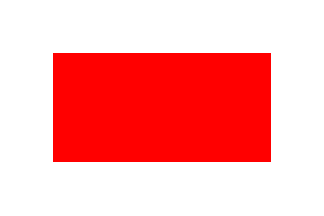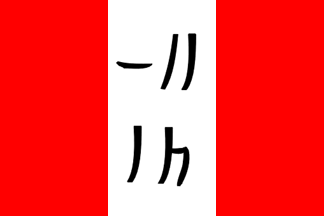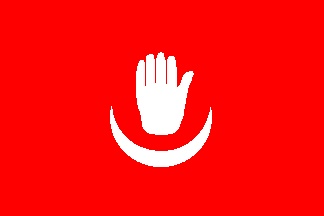
Last modified: 2022-10-22 by rob raeside
Keywords: anjouan | comoros |
Links: FOTW homepage |
search |
disclaimer and copyright |
write us |
mirrors
Anjouan page at the World Statesmen website: Flag images mostly taken from Jaume’s collection (no credit is shown) and some also from FOTW (as reported by Iain Walker, 02 Oct 2002, and António Martins, 08 Oct 2002)
In 1816, the Sultan of
Anjouan, threatened by
Zanzibar, asked for the protection of the Governor
of Bourbon Island (now La Réunion). On 21 April
1886, following the African Big Scramble,
France established a Protectorate, which was strengthened
on 08 January 1892. Anjouan was a Colony between 1912 and 1914, and later
incorporated into the Comoros.
Ivan Sache, 20 Apr 2002
 image by Jaume Ollé, 01 Apr 2003
image by Jaume Ollé, 01 Apr 2003
Once was another flag similar to the Kawasin flag of
Ras al Khaymah,
Sharjah and
Khor Kalba.
Jaume Ollé, 05 Jun 1997
According to
WorldStatesmen.ORG,
this flag, ≅1:2 plain (dark?) red, was used until 1833. What is the story
behind the dark shade? Anything to do with the later flag
with hand, apparently really of a darker shade (comparing with known medium
red flag)?
António Martins, 01 Apr 2003
 image by Jaume Ollé, 01 Apr 2003
image by Jaume Ollé, 01 Apr 2003
According to
WorldStatesmen.ORG,
this flag, ~2:3 red with wide white border, was used from 1833 to
an unspecified 19th century date. Was this the «No. 2 Flag» of the
General Maritime Treaty 1820? But, how so,
if Anjouan was already a French protectorate since 1816?
António Martins, 01 Apr 2003
 image by Jaume Ollé, 01 Apr 2003
image by Jaume Ollé, 01 Apr 2003
According to
WorldStatesmen.ORG,
this flag, ≅2:3 red-white-red vertical triband with black
letters on the white panel, was used circa 1850.
António Martins, 01 Apr 2003
The calligraphy on the flag does not look anything like the old Divehi
and the Eveyla scripts or the modern Thaana script used in the Maldives.
The symbols may have something to do with the fanditha magical symbolism
of the Maldives, but I have my doubts over that too.
Chris Abdul-Wahhab, Apr 2004
The flag itself is poorly documented, so it may well be that the original
looked different. One possibility is that the top word "-ll" is a
representation of the Arabic "ﷲ" ("Allah") by someone
who either was unfamiliar with Arabic script or saw the flag at a distance.
One problem with such an idea is that it provides no explanation for
the bottom "lh".
Ernest Cline, 09 Jul 2004
My theory is that these are magical symbols inspired on Arabic numbers.
Xavier Romero-Frias, Apr 2004
 image by Pascal Gross, 10 Apr 1998 |
image by Pascal Gross, 10 Apr 1998 |
Accordigng to Flggenmitteilung 31,
this is the last flag of the sultan of Anjouan.
Jaume Ollé, 05 Jun 1997
According to a report, the separatist movement in Anjouan adopted the
name Mawana, after a sultan that once ruled the island. A short note in
The Indian Ocean Newsletter (764 10.05.1997: p. 4) said that
«elements of Mwawana sawed down the flagpole flying the national flag and
hauled up the white [?] emblem of the late sultan».
Jan Oskar Engene, Jun 1997
The flag used by the Anjouani separatists was
the personal standard of
the last Sultan, Omar. This information was
communicated in 1980 to L. Philippe [phi02a]
by Said Ali Kemal, the Comorian Ambassador in France, who was the nephew of
the Sultan of Anjouan and one of the sons of the Sultan of Grande Comore.
Ivan Sache, 18 Jul 2002